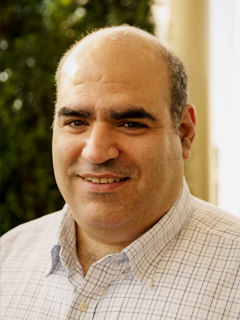HOW CAN WE HELP YOU? Call 1-800-TRY-CHOP
In This Section

Dr. Cardinale's research is focused on understanding the mechanisms of gene expression and gene regulation in autoimmune diseases, including inflammatory bowel disease, type 1 diabetes, and systemic sclerosis. He uses data from large-scale genomic studies to identify disease-causing genetic variants and functionally explore the target genes of those variants.
Bio
Autoimmune diseases have a complex mode of inheritance, with studies showing that siblings and family members of people with diseases like Crohn's, ulcerative colitis, and diabetes have a significantly increased risk of being affected, yet the pattern does not fit the simple single-gene model. Rather, these conditions, like most human traits, are influenced by hundreds of small single nucleotide polymorphisms (SNPs) located in the 99% of the genome that does not encode protein.
Presumably, these causal SNPs alter transcription protein binding, resulting in changes in the expression level of protein- and RNA-coding genes in specific contexts and cell types. A powerful approach to identify culprit SNPs is the genome-wide association study (GWAS), which compares millions of SNPs in affected individuals to a control population.
Dr. Cardinale's research focuses on characterizing the protein- and RNA-coding genes whose expression is altered by the disease-causing SNPs and the mechanism by which transcription factors recognize the SNPs to produce changes in gene expression. Some of the genes he’s investigated include TNFRSF6B, HTATIP2, and TNFSF14.
Among his accomplishments, Dr. Cardinale:
- Found an enrichment of functionally defective coding variants in Decoy Receptor 3 (TNFRSF6B) in early-onset IBD
- Studied mechanism and consequence of noncoding polymorphism in JAK2 promoter in Jurkat T cells
- Identified increased levels of the biomarker TNFSF14 in pediatric Crohn’s disease
- Identified a causal polymorphism and its target gene, HTATIP2, in the age of onset of type 1 diabetes
Education and Training
BA, Harvard University (Biochemical Sciences), 1999
PhD, New York University (Cellular and Molecular Biology), 2008
MD, New York University, 2010
Postdoctoral, Children's Hospital of Philadelphia (Molecular Genetics), 2015
Titles and Academic Titles
Senior Research Scientist
Professional Memberships
American Society of Human Genetics, 2015-
American Association of Immunologists, 2023-